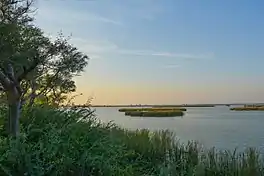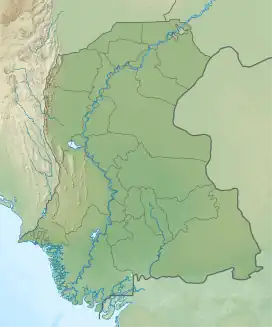Haleji Lake
Haleji Lake (Urdu: ہالیجی جھیل) is a perennial freshwater lake in Thatta District of Sindh Province, Pakistan. It is 6.58 km2 (2.54 sq mi) in size and is surrounded by marshes and brackish seepage lagoons.[2]
| Haleji Lake | |
|---|---|
 | |
 Haleji Lake | |
| Location | Thatta District, Sindh, Pakistan |
| Coordinates | 24.806°N 67.779°E |
| Basin countries | Pakistan |
| Max. length | 2 km (1.2 mi) |
| Max. width | 2 km (1.2 mi) |
| Surface area | 4 km2 (1.5 sq mi) |
| Average depth | 5 m (16 ft) |
| Max. depth | 5 m (16 ft) |
| Settlements | Thatta, Karachi |
| Designated | 23 July 1976 |
| Reference no. | 101[1] |
History
Haleji Lake was a saline lagoon until the 1930s and was converted into a reservoir to provide additional water to Karachi.[2] During World War II, additional water was required for troops stationed at Karachi. The then-British Government of Sindh Province decided to increase the capacity of the lake by introducing a feeder canal from the Indus River. Salt water was drained out and an embankment was constructed around the lake which was fed with fresh water through a canal. The work was placed on a war footing and was completed within 24 months in 1943.
Fauna
Haleji Lake is a wintering site for waterfowl such as cotton teal, Indian spot-billed duck, purple moorhen and pheasant-tailed jacana. It is also a breeding site for egrets and herons.[2]
See also
References
- "Haleji Lake". Ramsar Sites Information Service. Retrieved 25 April 2018.
- Khan, M.Z.; Abbas, D.; Ghalib, S.A.; Yasmeen, R.; Siddiqui, S.; Mehmood, N.; Zehra, A.; Begum, A.; Jabeen, T.; Yasmeen, G.; Latif, T.A. (2012). "Effects of environmental pollution on aquatic vertebrates and inventories of Haleji and Keenjhar Lakes: Ramsar Sites". Canadian Journal of Pure and Applied Sciences. 6 (1): 1759–1783.